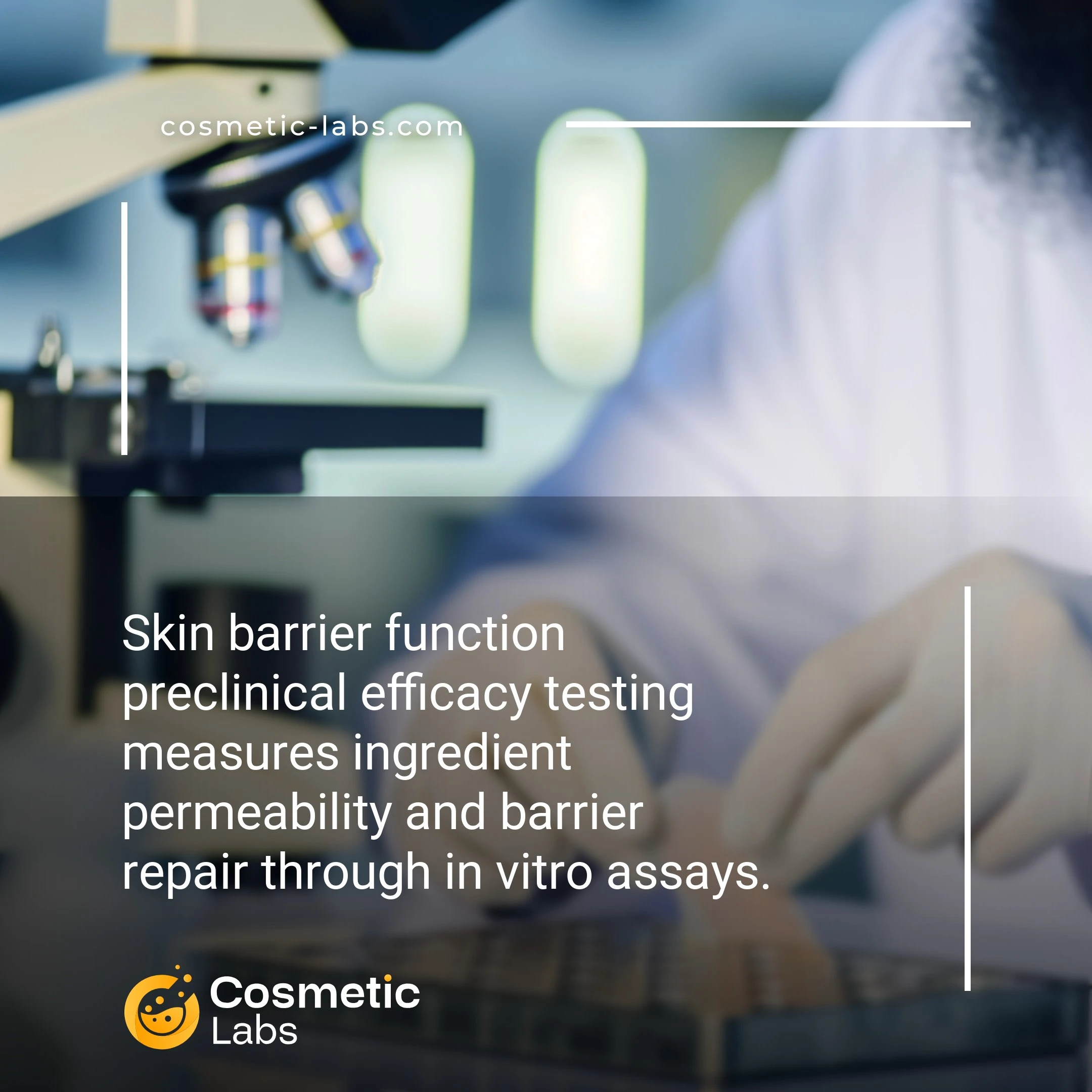Skin Barrier Testing Services for Cosmetic Efficacy

What is Skin barrier function efficacy testing?
Skin barrier function preclinical efficacy testing services measure how well cosmetic formulations protect and restore the skin’s natural protective barrier through laboratory-based assays. These tests evaluate transepidermal water loss (TEWL) and barrier repair mechanisms using cell cultures or skin models before human trials. Labs on our platform use standardized protocols to assess barrier strengthening claims, helping brands validate product performance and support marketing statements with scientific data within 2-4 weeks.
Why do you need this service?
Cosmetic labs use barrier function testing to validate moisturizer claims before market launch, measuring transepidermal water loss and stratum corneum hydration levels in controlled studies. Brand owners rely on these protocols to support marketing statements about barrier repair serums and protective creams, while reducing regulatory risks through documented efficacy data that meets industry standards for cosmetic product registration.
Who provides Skin barrier function efficacy testing services?
All cosmetic labs providing Skin barrier function efficacy testing services
There is no company providing these services at the moment.
Skin Barrier Function Preclinical Efficacy Testing Services
Cosmetic labs provide skin barrier function testing to validate your product’s protective and restorative claims before market launch. These preclinical assessments measure how effectively formulations maintain skin integrity, moisture retention, and defense against environmental stressors.
Transepidermal Water Loss (TEWL) Assessment
Labs measure water evaporation rates through the skin using specialized instruments that detect barrier dysfunction. This non-invasive testing reveals how your product affects skin permeability and moisture retention capacity.
Testing protocols include:
- Baseline TEWL measurements on untreated skin
- Post-application readings at 2, 4, and 8-hour intervals
- Comparison studies against control formulations
- Statistical analysis of barrier improvement percentages
Results help you substantiate claims about barrier repair and hydration benefits with quantifiable data.
Corneometer Hydration Analysis
Labs use corneometry to measure skin surface hydration levels and track moisture changes over time. This electrical conductance method provides precise readings of your product’s moisturizing performance on the stratum corneum.
Testing includes:
- Pre-treatment hydration baseline establishment
- Product application under controlled conditions
- Hourly moisture measurements for 24-48 hours
- Comparative analysis against untreated control areas
These measurements support hydration claims and help optimize ingredient concentrations for maximum barrier support. Connect with experienced labs on our platform to design testing protocols that validate your specific barrier function claims.
8 subcategories of Skin barrier function efficacy testing services
There are no results matching your search
Practical Applications of Skin Barrier Function Preclinical Efficacy Testing
Beauty brands rely on skin barrier function preclinical efficacy testing applications to validate product claims before market launch and regulatory submission.
Anti-Aging and Repair Product Development
Labs measure transepidermal water loss (TEWL) and stratum corneum hydration to validate barrier repair claims for serums, creams, and treatments. Testing protocols evaluate ceramide delivery systems, peptide formulations, and botanical extracts over 24-72 hour periods. TEWL reduction of 15-25% typically supports barrier strengthening claims for regulatory dossiers.
Corneometer readings and impedance measurements track moisture retention across different skin models. Labs test ingredient combinations like niacinamide with hyaluronic acid or retinol with barrier-supporting lipids to optimize formulation efficacy.
Sensitive Skin and Dermatitis Product Validation
Cosmetic labs use barrier function testing to validate gentle formulations for sensitive skin conditions and atopic dermatitis management. Testing includes irritation potential assessment through barrier integrity measurements and inflammatory marker analysis. Products showing maintained or improved barrier function with reduced cytokine release pass validation for sensitive skin claims.
Labs evaluate preservative systems, surfactant combinations, and pH levels to ensure formulations won’t compromise barrier integrity. Barrier recovery time under 48 hours supports gentle formulation claims for marketing materials.
| Test Parameter | Measurement Method | Typical Results Timeline | Claim Support |
|---|---|---|---|
| TEWL Reduction | Evaporimeter readings | 24-72 hours | Barrier repair, moisture retention |
| Stratum Corneum Hydration | Corneometer measurements | 2-4 weeks | Hydrating, skin conditioning |
| Barrier Recovery | Tape stripping + TEWL | 48-96 hours | Gentle, non-irritating |
| Lipid Organization | Infrared spectroscopy | 1-2 weeks | Barrier strengthening |
Connect with experienced cosmetic labs on our platform to discuss your skin barrier testing requirements and develop validation protocols for your specific formulations.

